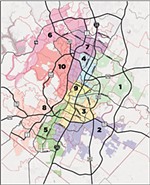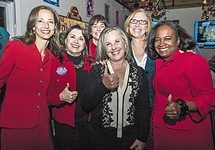Point Austin: Look If You Like ...
What we do when we do endorsements
By Michael King, Fri., Oct. 17, 2014

Feel free to ignore us.
That's always the first principle of Chronicle editorial board endorsements, which are simply the considered recommendations of a group of people who closely follow local, state, and national politics. We do the best we can with the information we have accumulated, based initially on reporting and reading, and then (in local races) on interviewing smaller groups of candidates winnowed from larger fields. Unlike dailies, where the opinion aspects of the papers are somewhat insulated from their reporting functions – a polite fiction that allows the reporters to pretend to "objectivity" – the Chronicle is frankly an advocacy publication, generally "left-liberal" or "progressive" in perspective (with many internal shadings). In the News department, we strive to be fair rather than "objective" – the latter concept largely a journalism-cum-business-school invention of academic "professionalism" and a marketing strategy to pretend to be all things to all readers ("consumers of news").
As reporters, writers, and editors, we believe that if we haven't succeeded in saying things worth disputing, then we're saying very little. It would mean we're simply not doing our jobs.
Our editorial board is a flexible group, comprised when fully assembled of Publisher Nick Barbaro, Editor Louis Black, Managing Editor Kimberley Jones, and the News staff. The group is not large in number, and we trust each other enough to sometimes share opinions in de facto subcommittees – the size of our staff, and its myriad responsibilities, make any other procedure impossible.
The latter circumstance has been greatly exaggerated in the current election year by the scale of the ballot, including the one-time explosion of candidates for mayor and City Council. It has meant a great many candidate interviews and meetings on the wing – so many that we've perforce had to hold off on a couple of additional endorsements for a few days, simply to have time to interview a few more candidates.
Think Globally, Vote Locally
That's actually less of a problem for city voters, since for the first time they'll be selecting only the mayor citywide and then choosing from a single slate of candidates in their particular districts. Nevertheless, there's a huge general election ballot to consider – please do work your way down, through state and county to the city candidates and the single city transportation proposition. There are also important Austin Community College questions (including bond proposals) and AISD candidates. We've done our best to work through these choices as well – not only in our endorsements, but in ongoing reporting – so that we hope we've helped readers navigate otherwise low-information waters.
On that score, as in our general news reporting, the Chronicle's focus has always been fiercely local – not only because that's where our close attention lies, but because we know from long experience that our greatest potential influence is on local matters. We may be enthusiastic about Wendy Davis and Leticia Van de Putte (indeed we are), but we're not deluding ourselves that most Chronicle readers are going to vote for state or national candidates because we endorsed them. (And until state politics become less polarized, with the major parties divided on very basic principles, it's going to be largely a straight-ticket Texas.)
In a local race, however, where the distinctions among progressive candidates may be narrow, we know that what we say may be decisive, or at least highly influential, in determining the outcome. We take that responsibility quite seriously.
Close Questions
That doesn't mean we all agree. Rather than take majoritarian votes, the editorial group attempts to arrive at a consensus on whom or what to recommend. That's not always easy or even doable; occasionally we issue split recommendations, or "no endorsement" in races where all the candidates seem unacceptable. There are several Council slates which feature several almost equally good candidates; rather than simply throw up our hands, we try to put ourselves in the position of a voter at the polls, who may look as long as he or she likes – but in the end, will have to leap.
In general, we don't have narrow litmus tests for candidates. Indeed, we're likely to have some differences among ourselves on specific issues – but we're as much interested in the candidates' general knowledge of government, and their adaptive thought processes on difficult policy questions, as we are in whether they have taken the "correct" position on some hot issue that, likely as not, will have faded in importance by the time one of them assumes office.
All this is some of what goes into our endorsement "process," proceeding while we're producing a weekly newspaper – and a daily online newspaper – at high speed. We're sometimes as exhausted as the candidates. We encourage readers not to be so tired, or reflexively cynical about politics, to defeat democracy without a fight, by not participating. Please accept our recommendations with a grain of your personal salt, in the spirit in which they are offered: as recommendations to thoughtful readers who arrive at the polls with your own experiences and perspectives, willing to take part in the work of representative government – which is to say, community.
Got something to say on the subject? Send a letter to the editor.












